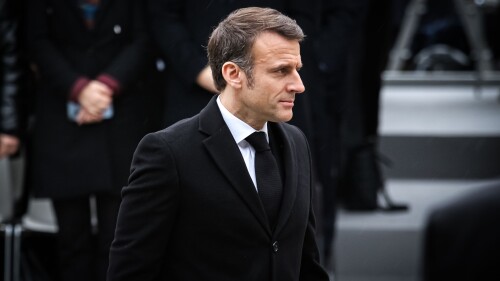“Make no mistake,” says Noëlle Lenoir. “The United Nations’ obsessional harassment of Israel has nothing to do with the preservation of peace, and the International Criminal Court’s move to indict Israel’s prime minister and minister of Defense for ‘war crimes’ in Gaza has nothing to do with the rule of law and international law.”
Madame Lenoir’s word carries weight — both in law and politics. An international lawyer based in Paris and a member of France’s Council of State, she sat for nine years, between 1992 and 2001, on France’s Constitutional Court and was France’s minister for European Affairs between 2002 and 2004.
In the current French and European political conversation, either in the press or on TV, she is seen as one of the most energetic, and most influential, stalwarts of the Western legal tradition against its detractors or falsifiers.
“The UN’s original agenda was ‘Never again,’” she elaborates for The New York Sun. “Never again wars of aggression, never again genocides, never again contempt for basic human rights. What we have now is not just a betrayal,” she says, “but an Orwellian inversion of these ethical imperatives.”
She points to “Iran chairing the UN Council on Human Rights, Saudi Arabia chairing the UN Committee on Women’s Rights, Israel being charged of genocide when fighting genocidal Hamas.”
She contends that “René Cassin, the French jurist of Judeo-Provençal descent who was, along with Eleanor Roosevelt, the main inspiration for the 1948 Universal Declaration of Human Rights, would roll over in his grave if he heard about it.”
“Likewise, the International Criminal Court, arguably the most inactive and procrastinating court in the world — it dealt with a dozen cases only over a period of more than twenty years, and it has hardly started investigating cases that are more than twenty years old — is rushing to incriminate Israel, in contradiction to both international law and its own foundational charter, the Rome Statute of 1998.”
How so? Madame Lenoir explains: “First and foremost, the Hamas attack against Israeli civilians on October 7 is clearly genocidal under international law, and the present Israeli military operations in Gaza are clearly a case of self-defense.”
Second, she says, “the procedure against Israel has been initiated at the request of the so-called ‘State of Palestine’, which, to this day, does not qualify as a sovereign State.”
For the record, she adds, “the Palestinian ‘non-State’ was admitted in 2005 into the community of the State Parties to the Rome Statute at the request of Mahmoud Abbas, who has headed the Palestinian Authority without elections ever since then.”
Finally, Madame Lenoir observes, “the Court is supposed, to quote the Rome Statute’s first article, to be ‘complementary to national jurisdictions': it should act only in such circumstances where national jurisdictions are not available, or not to be trusted. As it happens, Israel is endowed with one of the most robust and impartial judiciary apparatus in the world.”
According to the former French justice, the British Court’s chief prosecutor, Karim Ahmad Khan, is adding insult to injury by bringing charges both against two Israeli leaders — Prime Minister Netanyahu and Israel’s minister of defense, Yoav Galant — and three Hamas’s leaders, Yehya Sinwar, Ismaïl Haniyeh, and Mohammed Deif.
“It is like indicting Churchill and Roosevelt along with Goering, Keitel, and Ribbentrop at the Nuremberg trial,” she says. “Moreover, the practical consequences of an international indictment against the Hamas’s leaders are close to nil, whereas the indictment of Netanyahu and Gallant is likely to have severe consequences, both for them as persons and for the global image of the Israeli nation.”
Incidentally, Madame Lenoir admits that she was shocked to hear that the German government is ready to arrest Mr. Netanyahu on German soil if indicted “because this is the law.” She was shocked, she says, by this hasty and unnecessary declaration while young Israeli soldiers risk their lives and die to save their homeland. Something different would be expected today, especially considering Germany’s repeated commitment to the security of Israel and the Jewish people.
She is also troubled by the chief prosecutor’s blatant Islamic stand. “It is not common to hear an international official using publicly such expressions as ‘Inch’Allah,’" she says. “All the more so regarding a prosecutor to such a court.”
Indeed, there is still a chance that the International Criminal Court’s indictment division will not endorse Mr. Khan’s charges, just like the International Court of Justice dismissed earlier this year South Africa’s genocide complaint against Israel. However, if the prosecutor has his way, “one will have to ask whether the Court serves any purpose at all.”
“It looks as if the UN and many of its subsidiaries, including the International Court of Justice, are not international organizations anymore, but rather war machines against democracies,” she says. Among the UN founding nations, there was a majority of Western, or Western-style, functional democratic nations. Today, two-thirds of the member-States — sometimes described as “the global South” — are either non-functional or non-democratic and driven by intense “anti-Western” resentment. “This should not be ignored any longer,” she cautions.
In Madame Lenoir’s opinion, the best way to resist the global anti-democratic onslaught and the denaturation of international law is to resort, as systematically as possible, to the many jurisdictions that are still intact.
Feature, she says, the UN Relief and Works Agency for Palestine Refugees. “The involvement of parts of its personnel in Gaza with Hamas’s criminal or genocidal activities warrant actions against UNRWA’s management itself. Just like the misuse of UN or EU humanitarian subsidies.”
Complaint, she explains, “can be lodged with many national or international jurisdictions to that effect. Europe in particular, which claims to be exemplary in terms of human rights and which finances half of the subsidies paid to UNRWA, should seriously consider monitoring the use of the humanitarian aid it pays out via the United Nations. Failure to do so would engage its moral and even criminal responsibility.”








